6 Wolfdogs Rescued from Illegal Situation Embrace Their Wild Side at New Sanctuary Home (Exclusive)
Wild Spirit Wolf Sanctuary in New Mexico named the six wolf dogs after characters created by fantasy author Sarah J. Maas
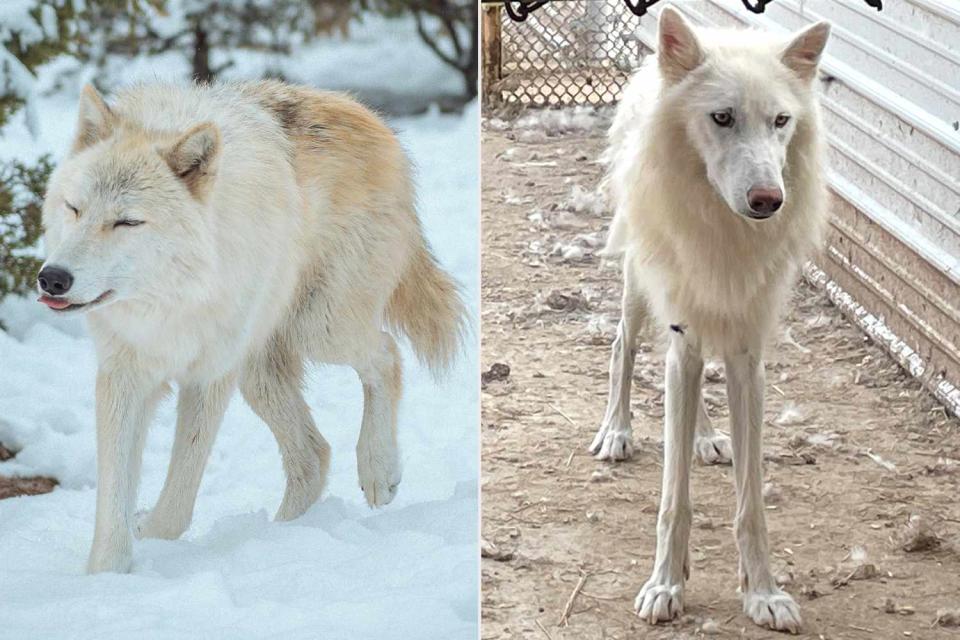
Katie Forbis at Wild Spirit Wolf Sanctuary; Wild Spirit Wolf Sanctuary
Azriel a wolfdog in the Pennsylvania 6 at Wild Spirit Wolf Sanctuary (left) and Ruhn the wolfdog from the same group prior to rescue (right).Six wolfdogs are spending their holiday season enjoying a winter wonderland after being kept as pets.
The pack of wolfdogs — canids that share genetic ancestry with wolves and domestic dogs — arrived at Wild Spirit Wolf Sanctuary after living in private enclosures in Pennslyvania, where it is illegal to keep wolfdogs as pets.
"Wild Spirit Wolf Sanctuary is a 501-C3 nonprofit organization located in Rama, New Mexico," Katie Forbis, the marketing manager and an animal caretaker at Wild Spirit Wolf Sanctuary, tells PEOPLE. "We are the largest canid-specific sanctuary in all of North America, and we also help facilitate more rescues than most other organizations in the United States."
Currently, the sanctuary, which is in a "super remote" location, is home to wolves, wolf dogs, New Guinea singing dogs, Australian dingoes, coyotes, and red foxes.
"We rescue captive, born and raised, non-releasable canids and provide them with a lifelong sanctuary and care. So, basically, we're not an adoption agency. Once we accept an animal into our care, they are here for the rest of their lives," Forbis says, adding that "none of the animals that we take in are eligible for release into the wild. They're completely and totally acclimated to humans and don't have any sort of survival skills. It'd be like letting your Pomeranian go to survive in the wild."
Like the other residents at the sanctuary, the six wolfdogs moved there after their previous situation became untenable.
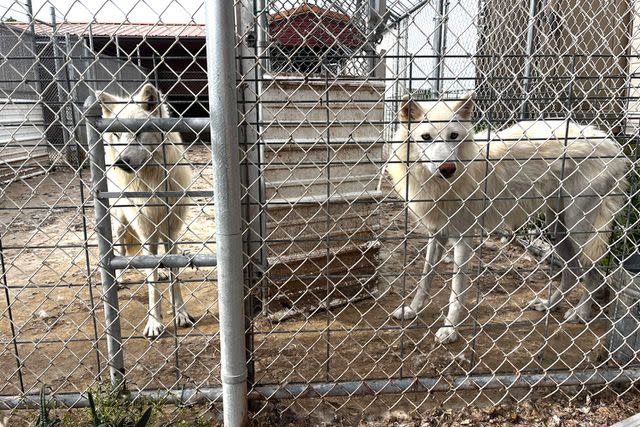
Wild Spirit Wolf Sanctuary
Emerie and Ruhn of the Pennsylvania 6 wolfdogs at their previous home in Pennsylvania"Pennsylvania is an illegal state for wolf dogs, basically 1% up, all banned illegal. But there was an owner there who had six of them, and he essentially was on his deathbed and reached out for help with his animals. He had predominantly high-content wolf dogs, which means they are predominantly gray wolf in their genetic makeup versus domestic dog," Forbis explains of the six wolf dogs' origins.
"And so we knew that there were six animals on site that needed a place to go, or else the state would take them and euthanize them because they are not legal in the state, and they cannot be adopted out," she adds.
Wild Spirit Wolf Sanctuary learned about the at-risk wolf dogs in Pennslyvania from the Wolf Dog Rescue Network, an email list among rescuers, sanctuaries, and organizations highlighting wolfdogs needing rescue homes. At first, Wild Spirit planned only to transport the six wolfdogs from Pennslyvania to a new home, but when no other organizations stepped forward to help the animals, Wild Spirit chose to take the wolfdogs in.
"We wanted to see these animals' lives saved. So we said we're going to do it. So, we built enclosures, drove all the way to Pennsylvania, got the wolfdogs, and brought them home," Forbis says.
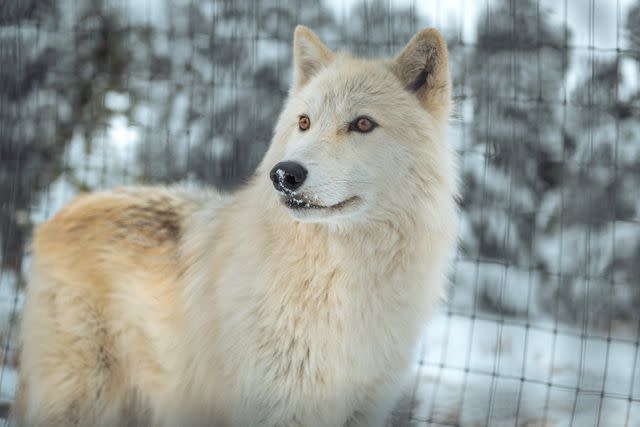
Katie Forbis at Wild Spirit Wolf Sanctuary
Azriel the wolfdog at Wild Spirit Wolf SanctuaryThe animals arrived in May and were each named after a character from books written by fantasy author Sarah J. Maas. Collectively, the six wolfdogs are known as the Pennsylvania 6.
And the Pennsylvania 6 has come far in six months. When the six wolfdogs, which include a mostly blind animal, moved into the sanctuary, "they were all extremely hands-off antisocial," says Forbis.
Today, the animals "are social and have friends." Instead of being cramped in small enclosures with little engagement, the wolfdogs each enjoy a quarter acre or more, natural elements, and winter snow.
Related: 3 Fire Departments Help Save 100-Lb. Great Dane Puppy After Dog Falls Down North Carolina Well
The animals don't reside in their enclosures alone. Instead, each wolfdog was paired with a roommate of the opposite sex to dissuade the same-sex aggression that can arise between wolves once they reach sexual maturity.
Two animals from the Pennsylvania 6, Cassian and Nesta, are currently looking after a wolfdog pup that was rescued by the sanctuary from Minnesota.
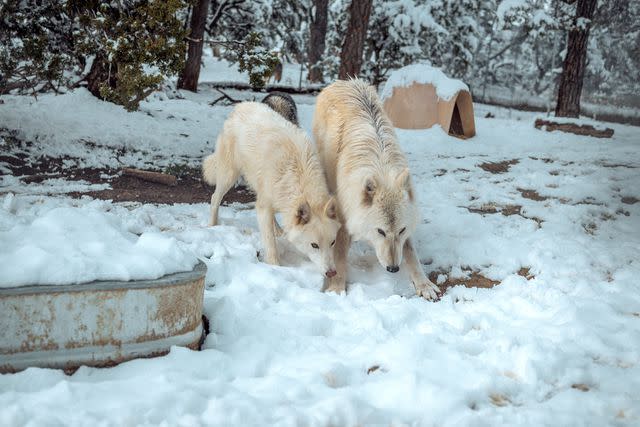
Katie Forbis at Wild Spirit Wolf Sanctuary
Nesta and Cassian the wolfdogs in their shared enclosure at Wild Spirit Wolf Sanctuary"Wolves and wolf dogs of higher content levels have this innate desire to care for puppies and younglings because they survive in the wild through coaching. So there's this thing called puppy privilege that most wolf dogs will extend to young wolf dogs," Forbis shares.
That's what happened when Nesta and Cassian met their rescue pup. Both wolfdogs started caring for the new arrival, and now the three animals are "the sweetest trio." The relationship has helped each member of the new family gain confidence.
"It goes to show if you give them a really good environment and are patient and respect what they're telling you, there's a lot of possibility and potential with them," Forbis says of wolfdogs.
The animal caretaker does not recommend owning wolfdogs as pets because they require much more resources, time, and patience than the average domestic dog.
"I don't think that 99.99% of people should own a wolfdog because of how absolutely bonkers it is to care for these animals. Even your lower content animals that may be 25% gray wolf and the rest dog, that's basically owning a husky on steroids, and huskies are not made for most people and most lifestyles," Forbis says.
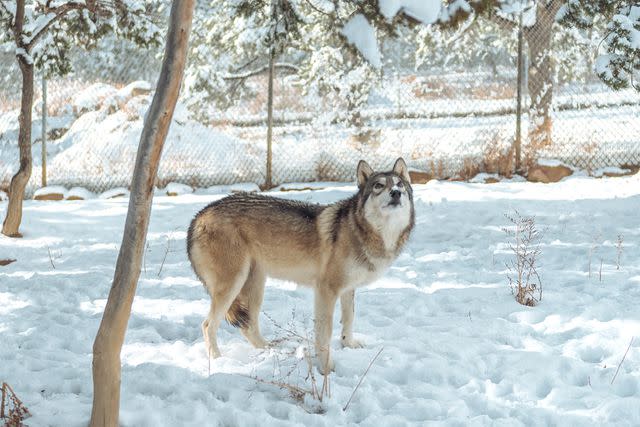
Katie Forbis at Wild Spirit Wolf Sanctuary
Amren the wolfdog at Wild Spirit Wolf Sanctuary in New MexicoNever miss a story — sign up for PEOPLE's free daily newsletter to stay up-to-date on the best of what PEOPLE has to offer, from juicy celebrity news to compelling human interest stories.
"It's basically like having a permanent toddler that's also part shark," she adds of caring for wolfdogs, especially those with a higher wolf content.
Those interested in learning more about wolfdogs without the responsibility of ownership, can do so by visiting Wild Spirit Wolf Sanctuary.
"We are open to the public. So you can come out, camp, and fall asleep under the stars to the wolves howling, which is pretty fun," Forbis says.
If you can't make the trip but are still interested in helping rescue wolfdogs like those in the Pennsylvania 6, you can support Wild Spirt's work by donating through the nonprofit's website or sharing the sanctuary's work on social media.
For more People news, make sure to sign up for our newsletter!
Read the original article on People.


